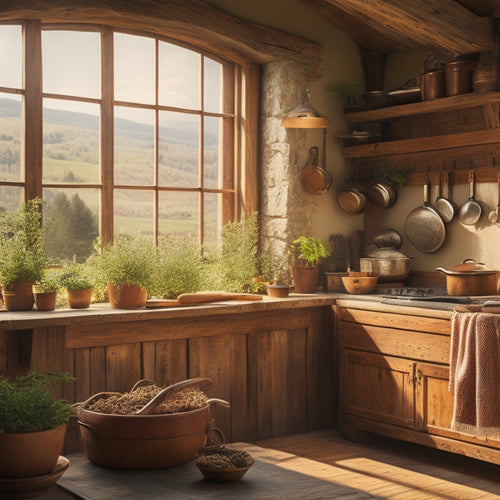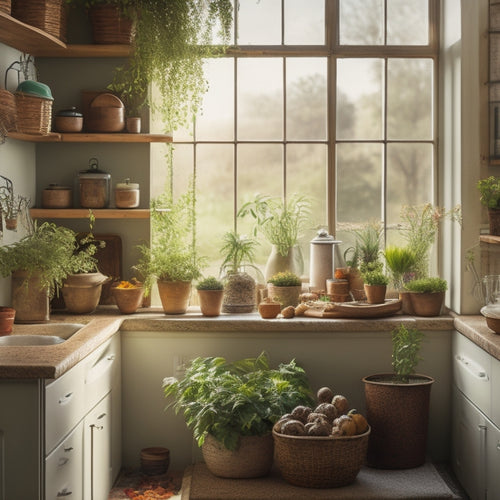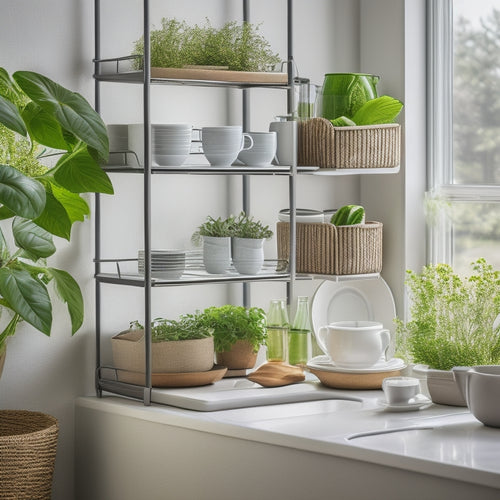
10 Free Kitchen Storage Hacks to Declutter Fast
Share
You're just a few tweaks away from having a clutter-free kitchen. Start by repurposing old items like mason jars and tin cans into rustic canisters and storage solutions. Utilize vertical wall space by installing shelves, hooks, or pegboards to hang items. Create DIY magnetic spice strips and carousel stations to maximize corner cabinet storage. Corral small items into decorative baskets and categorize similar items together. Get rid of duplicated, broken, or unused items, and be honest about what you need. With these hacks, you'll be well on your way to a decluttered kitchen - and there's even more where that came from.
Key Takeaways
• Repurpose old items like mason jars, tin cans, and cardboard boxes to create unique storage solutions for your kitchen.
• Maximize vertical space by installing shelves, hooks, or pegboards to declutter and organize your kitchen.
• Create DIY organization solutions like magnetic spice strips, carousel, or lazy Susan to access items in corner cabinets.
• Use decorative baskets and clear containers to categorize and store small items, and label them for easy identification.
• Declutter your kitchen by sorting items into keep, donate/sell, and toss piles, and get rid of duplicated or unused items.
Repurpose Old Items Creatively
Transform old mason jars into rustic canisters for storing dry goods like flour, sugar, or coffee beans. You'll be surprised at how these forgotten treasures can be revamped to add a touch of rustic charm to your kitchen.
Simply clean and dry the jars, then decorate them with paint, stickers, or ribbons to match your kitchen's aesthetic. Fill them with dry goods and label them for easy identification.
You can also repurpose old tin cans, wooden crates, or cardboard boxes to store kitchen essentials. Think outside the box (or can!) and get creative with items you'd normally throw away.
For instance, an old tin can become a utensil holder, while a wooden crate can be transformed into a spice rack.
Utilize Vertical Wall Space
Maximize your kitchen's wall space by installing shelves, hooks, or a pegboard to hang frequently used items like pots, pans, utensils, and even spices, freeing up valuable counter and cabinet space. This won't only declutter your kitchen but also make it look more organized and visually appealing. You can also add some wall decor to make the space more inviting.
Use shelf dividers to separate and categorize your items, making it easier to find what you need when you need it. For example, you can designate a shelf for baking supplies, another for cooking utensils, and another for spices. This will help you maintain a sense of order and make meal prep more efficient.
DIY Magnetic Spice Strips
Create a convenient and space-saving solution for your spices by making your own DIY magnetic spice strips, which can be easily attached to your fridge or any metal surface in your kitchen. You'll be amazed at how this simple hack can elevate your kitchen aesthetics while keeping your spices organized and within reach.
To get started, you'll need a few basic materials like adhesive magnets, wooden or plastic strips, and a hot glue gun. Simply attach the magnets to the strips, and then glue the spice containers to the strips. You can customize the length and design of your strips to fit your kitchen's unique style.
This DIY project is a game-changer for spice organization, allowing you to store your spices in a compact and accessible way. No more cluttered countertops or digging through drawers to find the right spice. With your new magnetic spice strips, you'll be able to easily identify and grab the spices you need, saving you time and hassle in the kitchen.
Plus, the sleek and modern design will add a touch of sophistication to your kitchen's decor. So why not give it a try and take your kitchen's functionality to the next level?
Maximize Corner Cabinet Storage
You can maximize the full potential of your corner cabinets by installing a carousel or lazy Susan, which allows you to easily access items that would otherwise be hidden from view. This simple hack eliminates blind spots and makes it easy to find what you need in a flash.
Corner shelves are another great option to maximize storage in these often-wasted spaces. You can install fixed shelves or adjustable ones to fit your specific needs. Consider adding baskets or bins to store items like snacks, spices, or cooking utensils. This will keep them organized and within reach.
Create a Pegboard Station
Now that you've optimized your corner cabinet storage, it's time to tackle another kitchen storage challenge: creating a pegboard station. You'll be amazed at how this simple setup can keep your kitchen tools and accessories within easy reach.
Pegboard Organization Ideas
Maximize your kitchen's vertical space by installing a pegboard station, a versatile and customizable storage solution that keeps frequently used items within easy reach. This clever organization hack allows you to optimize your kitchen's layout, freeing up counter space and reducing clutter.
To get the most out of your pegboard station, consider the following customization options:
-
Pegboard accessories: Choose from a variety of hooks, bins, and holders to store items like utensils, spices, and oils.
-
Customization options: Select a pegboard that fits your kitchen's style, from modern and sleek to rustic and charming.
-
Layout flexibility: Arrange your pegboard accessories to accommodate your cooking habits and preferences.
Tools and Accessories
Build your pegboard station with a curated selection of tools and accessories that cater to your cooking needs, ensuring everything you require is conveniently within arm's reach. This will help you stay organized and focused on serving delicious meals to your family and friends.
Start by selecting your most frequently used kitchen gadgets and cooking utensils, such as a garlic press, kitchen shears, and silicone spatulas. Hang them on the pegboard using hooks, bins, and baskets that fit your style and space.
Consider adding a few clever organizers, like a utensil holder or a magnetic strip for knives, to keep your countertops clear. You can also incorporate a small shelf or tray for storing oils, spices, or other essentials. Don't forget to leave some space for future additions – you never know when you'll discover a new favorite kitchen gadget!
With your pegboard station set up, you'll be able to quickly access the tools you need, streamlining your cooking process and freeing up more time to focus on the people you're serving.
Optimize Your Cabinet Layout
You can greatly enhance your kitchen's storage capacity by rearranging your cabinet layout to prioritize frequently used items and group similar items together. This simple hack can make a huge difference in the functionality of your kitchen.
Take stock of your cabinet dimensions and shelf allocation to determine the most efficient way to organize your items.
Here are three tips to get you started:
-
Assign zones: Divide your cabinets into zones based on the type of items you store, such as baking, cooking, or dinnerware.
-
Store heavy items below: Heavy items like pots and pans should be stored in lower cabinets to make them easier to access.
-
Maximize vertical space: Use stackable containers or baskets to maximize vertical space in your cabinets and keep similar items together.
Upcycle Old Furniture Pieces
Give new life to old furniture pieces by repurposing them as unique storage solutions in your kitchen. For example, you can turn an old dresser into a kitchen island or use a vintage ladder as a pot rack. Another idea is to repurpose old nightstands by converting them into kitchen carts or additional counter space. Simply attach casters to the legs, add a butcher-block top, and you'll have a mobile kitchen station.
Vintage dressers can also be repurposed as kitchen storage units. Remove the drawers and attach baskets, bins, or shelves to store kitchen essentials like utensils, spices, or cookbooks. Another creative option is to hang a vintage dresser door on the wall and use it as a spice rack or a place to store frequently used items like oils, condiments, or snacks.
Make the Most of Shelves
You're probably already using shelves in your kitchen, but are you making the most of them?
Take a closer look at your shelves and think about how you can maximize the space they provide.
Maximize Shelf Space
Optimizing your shelf space is essential to maintaining a clutter-free kitchen, and it starts with strategic placement of items to make sure everything has a designated home. By doing so, you'll reduce clutter, increase efficiency, and make meal prep a breeze.
Here are three simple ways to maximize your shelf space:
-
Use shelf dividers: Separate items into categories, such as baking supplies, cooking utensils, and dinnerware. This will prevent clutter from building up and make it easier to find what you need.
-
Label your shelves: Identify what's on each shelf with clear labels, so you can see what's inside without having to dig through everything. This is especially helpful for items stored in containers or baskets.
-
Store items by frequency of use: Place your most frequently used items in easy-to-reach locations, and store less frequently used items towards the back or on higher shelves. This will save you time and energy in the long run.
Utilize Vertical Height
Make the most of your kitchen's vertical space by installing shelves, hooks, or a pegboard that go all the way up to the ceiling, allowing you to store more items without taking up valuable floor or counter space.
This is especially useful if you have high ceilings, as you can take advantage of the extra room to store less frequently used items.
Consider using floor stretchers to reach those hard-to-access shelves, making it easier to retrieve items when you need them.
Use Baskets and Containers
Organize your kitchen's cluttered countertops by corralling small items like spices, oils, and condiments into decorative baskets and containers. This simple hack will help you achieve a clutter-free kitchen in no time. By using baskets and containers, you can categorize and store similar items together, making them easy to find when you need them.
Here are three essential items to keep in mind when selecting containers for your kitchen:
-
Stackable containers: Perfect for storing dry goods like pasta, rice, and snacks.
-
Clear containers: Ideal for storing spices, oils, and condiments, allowing you to see what's inside.
-
Labelled baskets: Great for storing utensils, kitchen tools, or cleaning supplies, and keeping them organized with a label.
When it comes to label organization, consider keeping in mind labels that are easy to read and understand. You can also use a label maker to create custom labels that fit your kitchen's style.
Designate a Junk Drawer
When you're ready to create a junk drawer, you'll need to tackle the chaos that's likely already there.
You'll want to sort through the clutter and get rid of anything you don't need or use.
Purge the Clutter First
Tackle the mess by pulling everything out of your kitchen cabinets and drawers, and sort items into three piles: keep, donate/sell, and toss. This is the first step to decluttering your kitchen and freeing up valuable storage space. Be honest with yourself – if you haven't used it in the past year, it's probably safe to get rid of it.
As you sort, categorize items into clutter categories, such as 'baking supplies' or 'cooking utensils.' This will help you see what you have and what you can get rid of. Be mindful of emotional attachment – just because your grandmother gave you that old mixing bowl doesn't mean you need to keep it. If it's not serving a purpose or bringing you joy, consider letting it go.
Here are three common kitchen items you can likely get rid of:
-
Duplicated items: If you have multiple items that serve the same purpose, keep only your favorite and get rid of the rest.
-
Broken or damaged items: If it's beyond repair, it's time to say goodbye.
-
Unused gadgets: Be realistic – if you haven't used that egg slicer in years, it's probably safe to get rid of it.
Assign a Home Base
Now that you've purged your kitchen of clutter, designate a specific drawer or cabinet as a 'junk drawer' where miscellaneous items can live, and give everything in it a designated spot.
This zone management strategy guarantees that items you don't use frequently, like batteries, twist ties, or extra buttons, have a home and don't clutter your countertops.
Allocate a specific space within the drawer or cabinet for each item, so you can easily find what you need when you need it.
Set Boundaries Now
Designate a specific drawer or cabinet as your 'junk drawer' where miscellaneous items can be stored, and allocate a specific space within it for each item. This boundary setting will help maintain order and prevent clutter from spreading to other areas of your kitchen. By setting a specific space for items like batteries, twist ties, or spare change, you'll be able to find what you need quickly and easily.
Here are three items to contemplate allocating space for in your junk drawer:
-
Cords and cables: Designate a specific area for storing cords, cables, and chargers to keep them organized and untangled.
-
Kitchen gadgets: Allocate space for small kitchen gadgets like garlic presses, bottle openers, or spice racks to keep them within easy reach.
-
Pantry overflow: Set aside a section for items that don't fit in your pantry, such as extra spices, oils, or snacks, to keep them organized and accessible.
Frequently Asked Questions
How Do I Prevent Clutter From Building up Again in the Future?
To prevent clutter from building up again, you'll form habits like daily tidying and create a maintenance routine, ensuring you stay on top of clutter and keep your space organized, helping others do the same.
Can I Use These Hacks in a Small Kitchen With Limited Space?
You can definitely use these hacks in a small kitchen with limited space by optimizing your layout and maximizing vertical storage, allowing you to make the most of every inch without sacrificing functionality.
Are These Storage Hacks Suitable for Renters or Temporary Spaces?
You think you're stuck with a rental kitchen that's as inflexible as a stubborn stain on your favorite apron. But fear not! Portable solutions and flexible layouts can be your best friends, allowing you to create a functional space that's as temporary as your lease.
How Do I Organize Kitchen Items That I Don't Use Frequently?
You'll efficiently store infrequently used kitchen items by categorizing them into seasonal rotation groups and assigning a designated shelf or bin, ensuring easy access when needed, and keeping your kitchen clutter-free.
Can I Involve My Kids in the Kitchen Decluttering and Organizing Process?
You can definitely involve your kids in the kitchen decluttering process, creating valuable teaching moments. Assign kid-friendly tasks, like sorting or categorizing, to instill responsibility and make it a fun, bonding experience for all.
Related Posts
-

Rustic Hanging Racks for Country-Style Kitchens
Rustic hanging racks are a game changer for your country-style kitchen, blending functionality with charm. They maxim...
-

Tiered Kitchen Rack Ideas for Small Spaces
Tiered kitchen racks are perfect for maximizing small spaces while adding style and functionality. Install wall-mount...
-

Tiered Dish Rack Organizers for Compact Spaces
Tiered dish rack organizers are perfect for compact spaces, maximizing vertical storage while saving precious counter...


